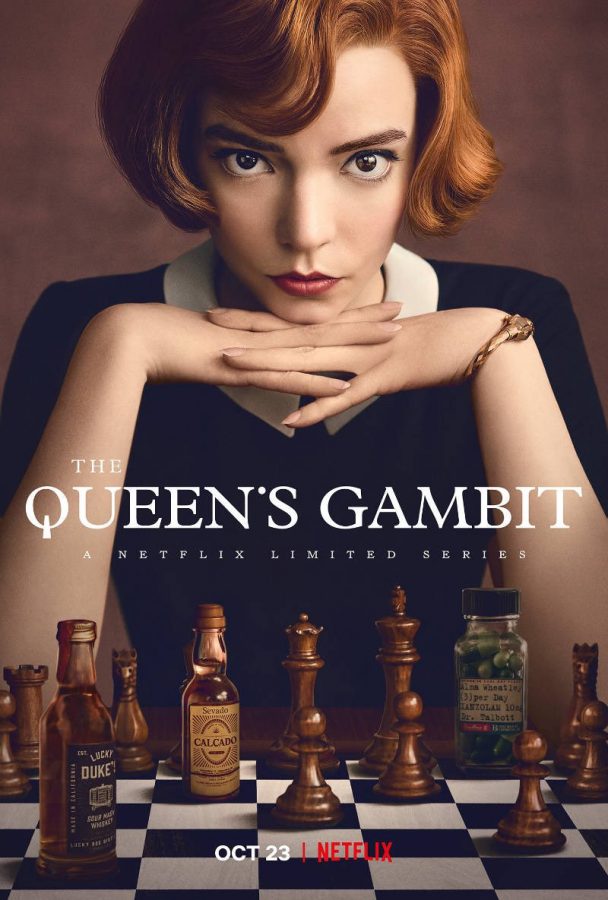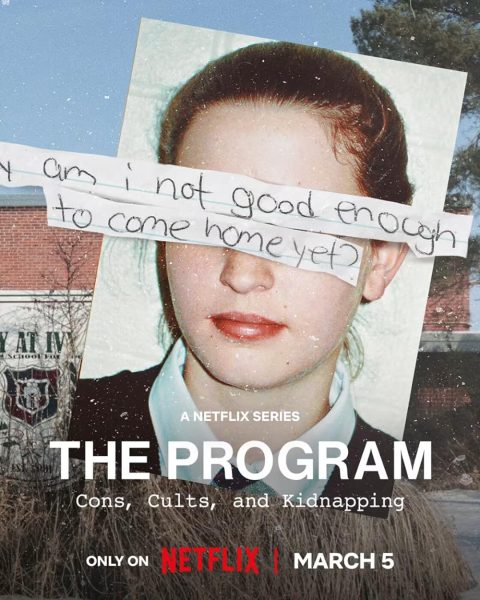Checkmate
Netflix’s “The Queen’s Gambit” is a success
“The Queen’s Gambit” follows chess prodigy, Beth Harmon, on her journey to become the top chess player in the world while struggling with addiction. ****/5
December 1, 2020
While placed into a two week quarantine, I frantically searched for a new show to watch that would help pass the time. For a while it seemed as if there were no new series anywhere, until I stumbled upon “The Queen’s Gambit,” which follows a young chess prodigy on her way to the top. Despite being hesitant to watch at first, I decided to give the series a try.
Beginning in the mid-50s and continuing through the 60s, the audience follows Beth Harmon (Anya Taylor-Joy) on her quest to become the greatest chess player in the world. After her parents die in a car crash, 9-year-old Beth is sent off to an orphanage and meets some friendly faces, such as an older girl, Jolene (Moses Ingram). When Beth arrives at the orphanage, the children are given daily pills, including tranquilizers, which Beth quickly becomes dependent on. In her classes at the orphanage, Beth gets in trouble often and is sent to the basement to clap erasers as a punishment. It’s there she meets the janitor, Mr. Shaibel (Bill Camp), who she notices playing chess. The two start meeting frequently in order to play chess together and learn new skills.
Mr. Shaibel realizes that Beth is very gifted and starts to introduce her to other chess players in the area. As her passion for chess grows, so does her addiction to pills. After a new law is passed outlawing the use of tranquilizers in orphanages, Beth becomes very antsy and ends up overdosing on pills found in the medical room, which leads to the guardians of the orphanage banning her from playing chess.
After a time jump, we see a 15-year-old Beth getting adopted by Mr. and Mrs. Wheatley (Patrick Kennedy and Marielle Heller). While running errands for Mrs. Wheatley, Beth notices that her adopted mother takes a prescription of tranquilizers, the same pills that she had been addicted to as a child. While dealing with normal teenage issues, such as mean girls and crushes, Beth is also forced to deal with her addictive tendencies and her goal of becoming the best chess player in the world.
I was very hesitant to watch this series at first because chess is always a game that I have viewed as being old-school and boring. Also, the strong role that addiction plays throughout the show made me think that the episodes would be very dark and depressing to watch. However, I was very pleasantly surprised with this series. The first episode kind of drags on, as there is a lot of background information that needs to be presented before the audience can get to Beth’s teenage years. While it might seem like the show will never pick up, I found that by the second episode I was completely hooked.
Although Beth is a very complicated character, I ended up really liking her throughout the series, and I thought that Taylor-Joy encompassed the character perfectly. In many of Netflix originals, the writers try to make the main character so quirky and awkward that they end up being very unlikeable and cringey to watch. The character of Beth on the other hand is very introverted and her personality shines through in a much more subtle way. What I liked the most was that she never let anyone hold her back from her goals and had no trouble standing up to people who doubted her. I also found it funny watching the juxtaposition of her and the other girl characters on the show because when other girls found comfort in having the newest clothes, Beth found comfort in having the newest chess set.
Despite all the preconceived notions I had about chess, the show actually gave me a newfound appreciation for it. The chess competition scenes were probably some of my favorite parts of the show. The visuals of Beth thinking through the chess plays are really stunning, and I found myself shocked that her brain could spot every possible move. I really enjoyed watching Beth compete against each player and change their attitudes about playing against a woman.
One thing to remember while watching the show is that during the time period, there were still very stark gender roles in the U.S. It was very frustrating as a woman to watch men write Beth off right away because they did not think that a woman could excel at chess. While there are a few women at the competitions, many of Beth’s competitors are men, especially the top-ranked players. It was interesting to see how Beth was not at all intimidated by being a woman in a male-dominated game and she never let her gender define her. A smile grew on my face every time I watched Beth take down one of her male competitors who had acted as if she wasn’t even worthy of their time.
While I would highly recommend this series, it is definitely not a mindless show that one can turn on in the background while doing something else. Also, it does deal with heavy topics such as death, alcohol and drug addiction. It is very hard to watch as Beth begins to sober up and then relapses back into a drug and alcohol binge. It is definitely not a happy feel-good show where nothing ever goes wrong and every problem is solved by the end of the episode.
Overall, I was pleasantly surprised with the series and ended up really loving it. I was very focused on Beth’s journey and liked following her through all the episodes. While the miniseries only contains seven episodes, each one is about an hour long which is plenty of time to let all aspects of the storyline develop. Netflix has produced a win with this show, and I definitely recommend it to anyone looking for a new watch.
















